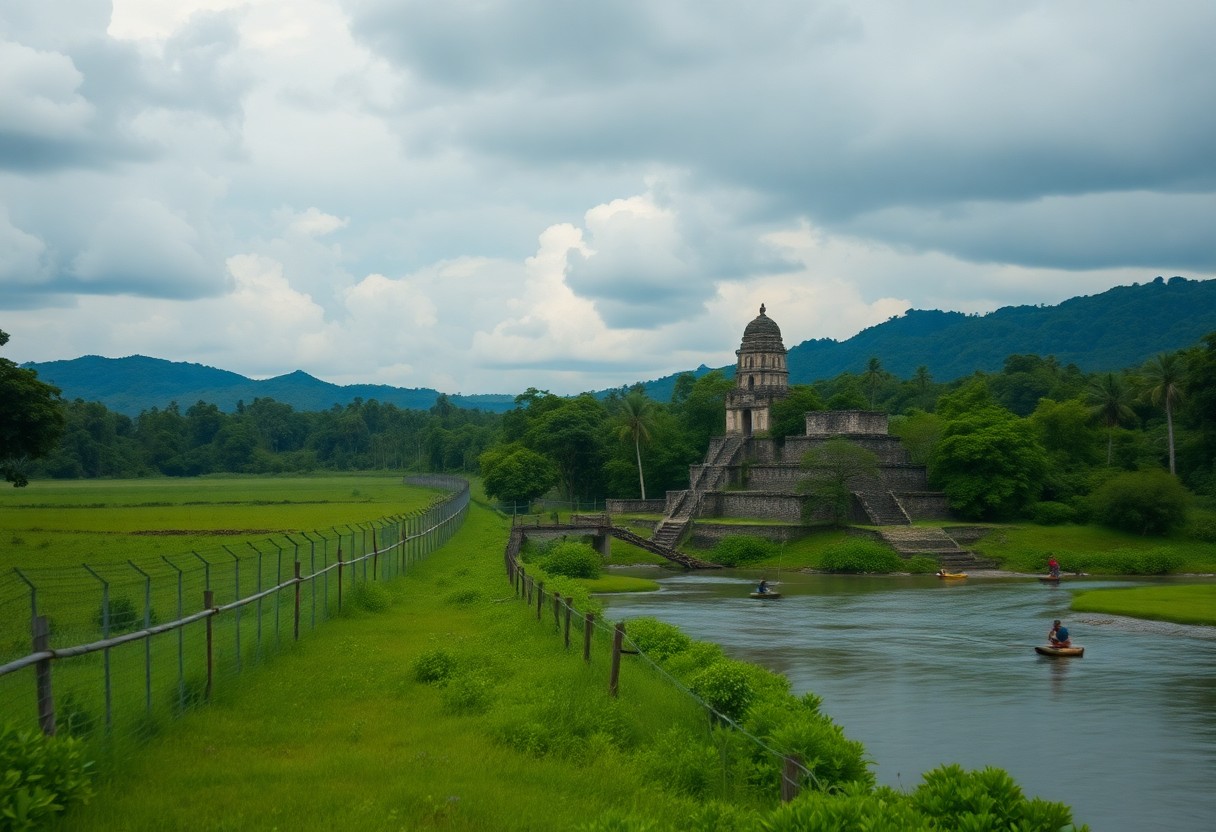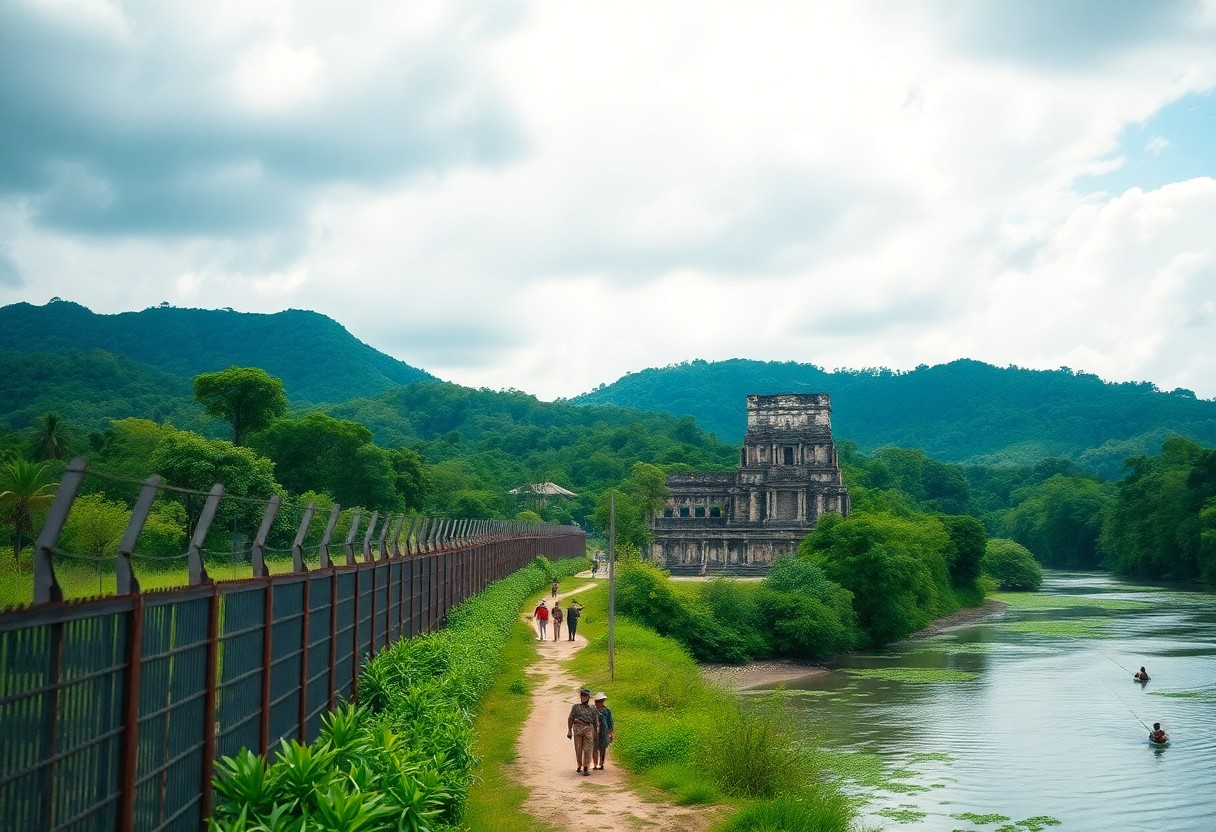The intricate and multifaceted territorial dispute between Belize and Guatemala illustrates a long-standing geopolitical tension that has endured for centuries, highlighting an unexpected level of complexity. This persistent border conflict, which is deeply entrenched in colonial-era claims, has historically posed a significant threat to regional stability. Since gaining independence, Guatemala has consistently contested Belize’s sovereignty. However, recent developments have sparked a flicker of hope for peaceful resolution. Significantly, both nations engaged in a historical 2019 referendum, allowing their populations to vote on resolving their differences through the International Court of Justice. This initiative marks a potential breakthrough in their contentious relationship. A comprehensive understanding of this border’s intricate history is vital for grasping the broader geopolitical dynamics of Central America and the implications for future relations.

Exploring the Colonial Influences Behind the Belize-Guatemala Dispute
The complexity of the territorial disagreement between Belize and Guatemala has its roots in colonial-era territorial claims, driven by Spanish imperial ambitions and British colonial expansion. This dispute emerged from the conflicting interests of European powers in Central America, with both nations asserting claims over strategically significant territories. Over time, these unresolved boundary issues have morphed into a persistent source of tension, reflecting the complicated historical dynamics surrounding territorial sovereignty in the region. The enduring legacy of these colonial claims continues to shape the political landscape today, showcasing how historical grievances profoundly influence modern diplomatic relations. Understanding these origins is critical for analyzing current events that arise from this long-standing conflict.
Dissecting the 1859 Boundary Treaty: Its Impact on Territorial Claims
Amidst the backdrop of imperial negotiations, the 1859 Boundary Treaty between Britain and Guatemala sought to clarify territorial borders. Yet, this agreement, intended to resolve conflicts, inadvertently created more complications than it resolved. The treaty’s vague language and its varied interpretations have become a fundamental source of ongoing territorial disputes between the two nations. The complexities surrounding the treaty underscore the lasting impact of colonial agreements on contemporary conflicts. As both Belize and Guatemala wrestle with the implications of historical treaties that were meant to provide clarity, they instead find themselves mired in disputes that continue to affect their bilateral relations today.
A Historical Journey Through Territorial Negotiations
From the era of Spanish colonial rule to the formation of modern nation-states, a convoluted landscape of territorial negotiations emerges. The geopolitical dynamics of the region were significantly influenced by imperial rivalries and the shifting boundaries of colonial territories, thus laying the groundwork for future conflicts. These boundary disputes reflect a more profound narrative involving colonial legacies and postcolonial territorial challenges that persist today. The strategic importance of the territory has historically driven conflicts, with Guatemala consistently contesting Belize’s sovereignty. The multifaceted nature of this dispute includes issues of historical interpretation, indigenous rights, and territorial integrity, rendering it a complex international controversy that continues to shape diplomatic relations between both nations, emphasizing the need for a nuanced understanding of these factors as they navigate this ongoing struggle.
Identifying the Core Issues Surrounding the Belize-Guatemala Border Dispute
The intricate border dispute between Belize and Guatemala encompasses a wide range of historical, territorial, and political dimensions. Key tensions stem from competing claims over land, sovereignty, and differing interpretations of history. Rooted in colonial boundaries, this conflict has been perpetuated by international legal disputes and enduring nationalist sentiments, creating significant challenges within the diplomatic landscape for both nations. Understanding these core issues is vital for addressing the complexities of the dispute and working toward a resolution that honors the interests of both countries. This conflict reflects broader themes of identity and national pride that are deeply ingrained in the history and culture of both Belize and Guatemala.
Examining Guatemala’s Territorial Claims: A Historical Perspective
Guatemala asserts claims to approximately 12,000 square kilometers of Belizean territory, basing its claims on historical rights that originate from Spanish colonial boundaries. These assertions challenge the legitimacy of British territorial acquisitions and focus on interpretations of historical treaties and colonial agreements that Guatemala contends were unjustly imposed. Such claims represent Guatemala’s ongoing struggle to reclaim what it considers ancestral land, revealing the deep-seated grievances that fuel the dispute. Understanding the historical roots of these claims requires a careful examination of the colonial context and its lasting impacts on contemporary diplomatic relations and legal arguments, ultimately shaping the narrative of the territorial conflict.
Belize’s Strong Defense of Its Sovereignty and Territorial Rights
Belize’s stance on sovereignty emphasizes the nation’s right to self-determination and the protection of its territorial integrity. Belize firmly asserts its independence and unequivocally rejects Guatemala’s territorial claims, underscoring the significance of international recognition and the legal principle of uti possidetis juris, which maintains existing colonial boundaries following independence. Furthermore, it is essential to recognize that Belize’s sovereignty is supported by international law and numerous United Nations resolutions. The country has consistently championed its territorial integrity through diplomatic channels, garnering international support to solidify its borders. Moreover, peaceful resolution mechanisms, including international mediation, have become crucial strategies in addressing this protracted dispute, demonstrating Belize’s commitment to diplomatic solutions rather than escalating tensions through conflict.

Evaluating Diplomatic Initiatives Targeted at Resolving the Dispute
The efforts to resolve the enduring border conflict between Belize and Guatemala have involved numerous international mechanisms and negotiations. Both nations recognize the potential risks associated with continued territorial tension, which has prompted them to seek peaceful solutions through Diplomatic channels. International mediation and bilateral discussions have played a significant role in gradually mitigating historical animosities and fostering pathways toward resolution. By understanding these diplomatic initiatives, we can shed light on the progress made and the challenges that still persist in achieving lasting peace. This illustrates the critical importance of sustained dialogue and international cooperation in navigating this complex geopolitical landscape.
Insights into the Development of Diplomatic Negotiations
The diplomatic negotiations between Belize and Guatemala have been characterized by gradual progress and strategic dialogue, aimed at nurturing mutual understanding. These talks have focused on exploring potential compromise solutions that could adequately satisfy the interests of both nations. Key diplomatic initiatives have included high-level meetings, bilateral commissions, and international facilitation, all centered on addressing territorial claims and promoting regional stability. This ongoing dialogue emphasizes the vital role of diplomacy in resolving complex geopolitical issues, underlining the necessity for patience and commitment from both parties to navigate the intricacies of their relationship effectively.
The Essential Role of the International Court of Justice in Mediation
The International Court of Justice (ICJ) plays a pivotal role in mediating the border dispute between Belize and Guatemala. The ICJ offers a neutral legal platform for addressing territorial claims, providing an internationally recognized mechanism for dispute resolution that has the potential to conclude decades of territorial tensions. The court’s involvement extends beyond mere arbitration; it represents a critical turning point in Belize-Guatemala relations. By consenting to submit their dispute to the ICJ, both countries have underscored their commitment to pursuing peaceful resolutions. The forthcoming ruling from the court could decisively delineate territorial boundaries, potentially establishing a permanent legal framework for future bilateral relations and fostering regional stability, serving as a model for resolving similar disputes globally.

Understanding the Travel and Trade Dynamics within the Context of the Dispute
To navigate the complex Belize-Guatemala border effectively, one must possess a comprehensive understanding of its multifaceted challenges. The historical territorial disputes have had significant repercussions on cross-border interactions, shaping unique travel and economic dynamics. The ongoing tensions have influenced transportation routes, trade patterns, and the diplomatic relations between these neighboring countries. The border region necessitates careful consideration of geopolitical sensitivities that could impact movement and economic exchanges, making it crucial for travelers to remain informed and well-prepared. Gaining insight into these dynamics is essential for anyone looking to engage in travel or trade across this politically sensitive area, ensuring a safe and informed experience.
Current Travel Guidelines for Safety and Awareness Along the Border
Traveling along the Belize-Guatemala border requires exercising heightened caution. Your safety depends on remaining informed about current diplomatic conditions and potential conflict zones. Official travel advisories recommend checking government websites prior to crossing, verifying necessary documentation, and maintaining awareness of local security situations. Meticulously planning your route, including the use of official border crossing points, can minimize risks and enhance your travel experience in this sensitive region. Engaging with local guides or authorities can provide additional insights into safe travel practices and facilitate navigation through the complexities of the border, ultimately ensuring a safer journey.
Analyzing Cross-Border Trade Dynamics and Economic Interdependence
The trade relations between Belize and Guatemala at the border remain intricate and continually evolving. Despite historical tensions, agricultural products and small-scale commercial exchanges continue, reflecting the economic interdependence that persists between these two nations. To fully understand these interactions, one must recognize the resilience of economic relationships that thrive despite political challenges. The trade landscape reveals a complex web of interactions where agricultural commodities such as sugar, citrus, and timber play significant roles in cross-border exchanges. Informal trade networks, facilitated by local merchants, maneuver through the diplomatic complexities, showcasing how economic cooperation can endure in the face of territorial disputes. Ongoing bilateral agreements and diplomatic negotiations continuously shape these economic interactions, offering promising prospects for future collaboration and mutual benefits, which are essential for the economic growth of both nations.
Examining the Socio-Political Implications of the Dispute
The border dispute between Belize and Guatemala transcends mere geographical lines, embodying profound socio-political implications for both nations. This territorial conflict significantly impacts diplomatic relations, national security strategies, and broader regional dynamics. The ongoing tensions create complex socio-political challenges that influence governmental strategies, international negotiations, and the daily lives of citizens in both countries. Understanding these implications is crucial for grasping the broader effects of the dispute on the region and recognizing how these challenges can affect future diplomatic endeavors, ultimately shaping the trajectory of Belize-Guatemala relations.
The Interplay of National Identity and Public Sentiment in the Context of the Dispute
The border dispute resonates deeply with national pride and historical narratives in both Belize and Guatemala. Each country views the territorial claims as a matter of fundamental sovereignty, leading to passionate public discourse and political sentiment. This conflict has become a symbol of national identity, as citizens ardently defend their historical perspectives and territorial integrity. The emotional weight of these claims shapes public opinion, influencing political discourse and national policy, thereby highlighting the intricate relationship between territorial disputes and national identity. Grasping these sentiments is essential for fostering dialogue and promoting reconciliation between the two nations, as they navigate this sensitive issue.
Assessing Regional Stability and Security Challenges Arising from the Dispute
The ongoing border dispute poses potential vulnerabilities in regional peace and cooperation. Unresolved territorial claims generate diplomatic tensions that could destabilize bilateral relationships and jeopardize broader regional security dynamics. Recognizing these challenges is vital for understanding the complex geopolitical landscape of Central America. The dispute represents more than just a territorial disagreement; it threatens regional stability through the risk of military escalations. The persistent tension complicates economic cooperation, cross-border trade, and collaborative security efforts. Awareness of these dynamics elucidates how unresolved territorial claims can undermine diplomatic progress and create long-term challenges for peaceful coexistence between Belize and Guatemala, necessitating a concerted effort toward conflict resolution.
Envisioning Future Pathways for Resolving the Dispute
Despite the complex historical tensions, the situation along the Belize-Guatemala border offers potential pathways for diplomatic resolution. The ongoing negotiations and international mediation hold the promise of achieving a peaceful settlement. The international community remains supportive of constructive dialogue between both nations, indicating that a comprehensive resolution may be attainable in the coming years. The commitment to diplomacy signifies a crucial step toward addressing longstanding grievances and fostering a more stable future, underscoring the need for sustained engagement and cooperation in the pursuit of peace.
Identifying Viable Resolutions to the Territorial Dispute
Resolutions to the enduring territorial dispute could involve international arbitration or a mutually agreed-upon territorial compromise. The recent willingness of both countries to engage in diplomatic discussions suggests that a mutually beneficial agreement may be forthcoming. The involvement of neutral international bodies could provide a structured framework for addressing historical claims, paving the way for more effective conflict resolution strategies. These avenues for resolution could not only address the current disputes but also set a precedent for handling similar conflicts on a global scale, illustrating the importance of collective international cooperation.
The Influence of International Relations on Border Negotiations
International relations play a significant role in shaping the border negotiations between Belize and Guatemala. Diplomatic channels have emerged as essential tools for managing territorial tensions and fostering constructive dialogue. Regional organizations and global diplomatic platforms continue to facilitate discussions and seek peaceful solutions. Additionally, the broader geopolitical context influences these border relations, as international pressure and diplomatic engagement create opportunities for resolution. The potential for economic cooperation, joint development projects, and shared security interests presents promising avenues for collaboration. Organizations like the OAS have played a pivotal role in mediating discussions and promoting peaceful interactions between the two nations, emphasizing the importance of multilateral support in resolving conflicts effectively.
Frequently Asked Questions Regarding the Belize-Guatemala Territorial Dispute
What is the historical background of the territorial dispute between Belize and Guatemala?
The territorial dispute stems from Spanish colonial claims and British settlements in the region during the 19th century. Spain initially claimed the territory, but Britain established settlements in Belize, leading to intricate legal and territorial challenges. The conflict centers on competing territorial assertions, with Guatemala maintaining claims to most of Belize’s land following Central American independence in 1821, complicating efforts toward reconciliation and peace.
How has the international community contributed to resolving the long-standing border conflict?
The Organization of American States (OAS) has played a significant mediation role in this dispute. In 2008, both countries agreed to submit the matter to the International Court of Justice (ICJ) for a binding resolution. A referendum in both Belize and Guatemala during 2018-2019 demonstrated public support for international judicial intervention, ultimately paving the way for a peaceful resolution mechanism that aligns with the will of the people.
What is the current status of the Belize-Guatemala border agreement following the ICJ ruling?
In May 2019, the ICJ definitively ruled on the territorial dispute, largely affirming Belize’s sovereignty while making minor adjustments to the border demarcation. The ruling granted Belize approximately 12,272 square kilometers of territory, providing a clear legal framework for future diplomatic relations and establishing permanent maritime and land boundaries between the two nations. This resolution represents a significant step forward in the quest for lasting peace and stability in the region.
The Article The Belize-Guatemala Border: History, Conflict, and Current Status appeared first on Belize Travel Guide
The Article Belize-Guatemala Border: Historical Conflicts and Current Status Was Found On https://limitsofstrategy.com